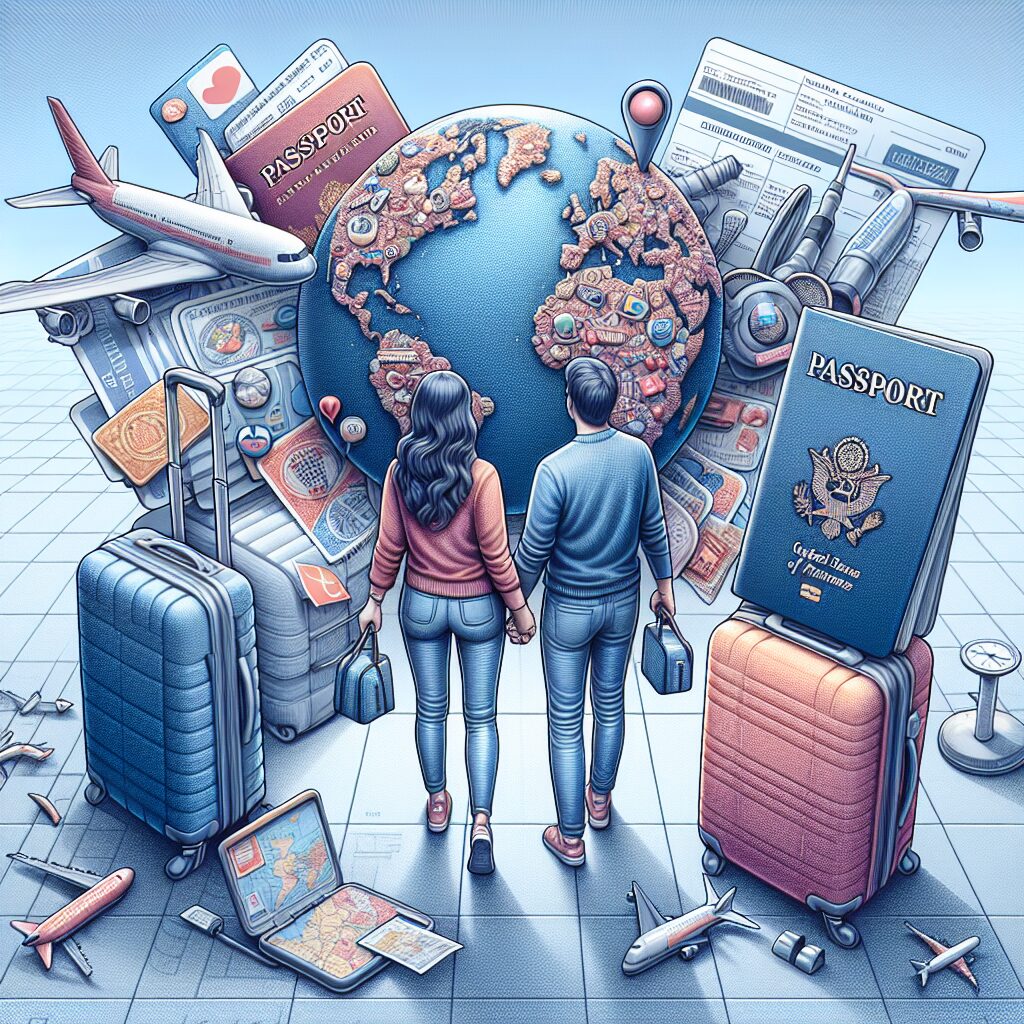Solo Travelers’ Guide to Language Learning: Exploring the World One Language at a Time
Did you know that there are over 6,500 languages spoken around the world today? Each language carries an essence of a unique culture and offers a gateway into a whole new world of experiences. And for solo travelers, the ability to communicate with locals in their native language can open up countless opportunities for deeper connections and meaningful experiences. In this article, we will explore the fascinating world of language learning for solo travelers and the specific impacts it can have on your adventures.
As a solo traveler, learning the local language can have a tremendous impact on your journey. Not only does it enable you to navigate through the practical aspects of traveling, such as ordering food or asking for directions, but it also allows you to immerse yourself in the culture and connect with the locals on a deeper level. Language learning creates a bridge between you and the people you encounter, breaking down barriers and fostering meaningful interactions that can enrich your travel experiences like never before.
Now that we understand the significance of language learning for solo travelers, let’s delve into the key takeaways that will guide you through your language learning journey. From the essential tools you need to get started to the most effective strategies for language acquisition, we will provide you with practical insights and tips that will empower you to embrace the world of language learning and awaken the adventurer within you. So, without further ado, let’s embark on this exciting linguistic journey together and discover the magic of traveling through languages.
Key Takeaways
1. Prioritize basic language skills: Focus on learning essential phrases and vocabulary relevant to your solo travel experience, such as greetings, directions, and basic conversational phrases.
2. Utilize language learning resources: Take advantage of online platforms, language apps, podcasts, and language exchange services to enhance your language skills before and during your solo travels. Use these resources to practice speaking, listening, and reading in your target language.
3. Immerse yourself in language and culture: Embrace local customs, interact with native speakers, and seek out opportunities to immerse yourself in the language and culture of your destination. Engage in conversations with locals, participate in language exchange meetups, and explore cultural events to enhance your language learning experience.
4. Overcome fear and practice speaking: Don’t be afraid to make mistakes and practice speaking the language. Interact with locals, order food in the local language, and engage in conversations whenever possible. Embrace the discomfort of making mistakes and view them as learning opportunities that can help you improve your language skills.
5. Document and review your progress: Maintain a language learning journal or use language learning apps to document new vocabulary, phrases, and experiences. Regularly review and practice what you’ve learned to reinforce your language skills and ensure continued progress throughout your solo travels.
How to Maximize Language Learning as a Solo Traveler?
1. Set Clear Language Learning Goals
Having clear goals is essential when learning a new language while traveling alone. Determine the level of fluency you want to achieve, as well as any specific skills or vocabulary relevant to your travel destinations. Whether it’s improving conversational skills or mastering important phrases, clear goals will keep you focused and motivated throughout your journey.
2. Immerse Yourself in Local Culture
When traveling solo, take advantage of the opportunity to immerse yourself in the local culture, including the language. Attend language exchange events, visit local markets, or join local tours where you can interact with native speakers. Immerse yourself in daily life, listen to conversations, and observe how locals communicate. This will not only enhance your language learning experience but also deepen your cultural understanding.
3. Utilize Language Learning Apps
Language learning apps are great companions for solo travelers. They provide interactive lessons, vocabulary exercises, and even pronunciation guides. Apps like Duolingo, Babbel, and HelloTalk offer a wide variety of languages to choose from and enable you to practice anytime, anywhere. Make sure to dedicate regular time using these apps to cement your language skills.
4. Seek Language Learning Opportunities
Take advantage of language learning opportunities while traveling by seeking out language schools, conversation exchanges, or private tutors. Enroll in short-term language courses or engage in one-on-one lessons tailored to your needs. These immersive experiences will accelerate your language learning progress and provide an opportunity to practice in real-life situations.
5. Create Your Own Study Materials
As a solo traveler, you can create personalized study materials to enhance your language learning journey. Develop flashcards, phrasebooks, or travel vocabularies that cater to your specific needs. Focus on phrases and vocabulary relevant to your travel plans, such as ordering food, navigating public transportation, or asking for directions. Having your own study materials ensures you’re prepared for practical communication during your travels.
6. Engage in Language Exchanges
Participating in language exchanges can greatly enhance your language learning experience. Seek out language exchange partners or join language exchange groups where you can practice speaking with native speakers. This exchange not only improves your conversational skills but also allows you to make new friends and learn about other cultures. Additionally, offering help in teaching your native language can create a mutually beneficial learning environment.
7. Embrace Language Challenges
Learning a new language can be challenging, especially for solo travelers. Embrace these challenges and view them as opportunities to grow and improve. Don’t be afraid to make mistakes, as they are an inherent part of the language learning process. Native speakers appreciate the effort you put into learning their language, so stay confident and keep practicing.
8. Practice Mindfulness and Patience
When learning a new language as a solo traveler, remember to practice mindfulness and patience. Understand that language learning takes time and effort, and progress may not be immediate. Be patient with yourself and celebrate small victories along the way. Practice mindfulness by being present in your language learning journey, enjoying the process, and staying motivated.
End Your Solo Travel Language Learning Experience with These Tips:
- What are the best language learning apps for solo travelers?
- How can I find language exchange partners while traveling alone?
- What are some effective study techniques to maximize language learning?
- How can I practice speaking the local language in real-life situations?
- Are there any specific resources or websites for solo travelers learning languages?
Frequently Asked Questions
1. Can I learn a new language while traveling alone?
Yes, absolutely! Traveling alone provides a unique opportunity to immerse yourself in the language and culture of your destination, making it an ideal time to learn a new language.
2. How can I make the most of my language learning journey as a solo traveler?
To make the most of your language learning journey as a solo traveler, consider taking language classes or finding a language exchange partner in your destination. Additionally, try to engage with locals as much as possible, practice speaking the language whenever you can, and use language learning apps or online resources for extra practice.
3. What are the benefits of learning a new language while traveling solo?
Learning a new language while traveling solo offers numerous benefits. It allows you to communicate with locals more effectively, better understand the local culture, and navigate your surroundings with ease. It can also enhance your travel experience by enabling you to make deeper connections and immersing yourself in the local way of life.
4. Is it necessary to have prior knowledge of the language before traveling alone?
No, prior knowledge of the language is not necessary. While it can be helpful to learn a few basic phrases before your trip, traveling alone provides an excellent opportunity to learn the language from scratch through immersion and real-life practice.
5. How long does it usually take to learn a new language as a solo traveler?
The time it takes to learn a new language as a solo traveler can vary depending on several factors, including the language itself, your dedication, the amount of time you spend immersed in the language, and your prior language learning experience. Generally, it takes several months to reach a conversational level, but fluency may take years of consistent practice.
6. Can I learn multiple languages while traveling alone?
While it’s possible to learn multiple languages while traveling alone, it’s important to manage your expectations and focus on one language at a time to achieve the best results. Trying to learn multiple languages simultaneously can be overwhelming and may hinder your progress.
7. Are there any specific countries that are best for solo travelers to learn a new language?
There are no specific countries that are universally best for solo travelers to learn a new language. It depends on the language you intend to learn and your personal preferences. However, countries where the target language is widely spoken and immersion opportunities are plentiful, such as Spain for learning Spanish, can be excellent choices.
8. How can I practice my language skills effectively as a solo traveler?
As a solo traveler, there are several effective ways to practice your language skills. Engage in conversations with locals, participate in language exchange events or groups, watch movies or TV shows in the target language, listen to podcasts or music, and try to think and speak in the language as much as possible during your daily activities.
9. What are some helpful resources for solo travelers learning a new language?
There are numerous resources available for solo travelers learning a new language. Language learning apps like Duolingo and Memrise offer interactive lessons and practice exercises. Online platforms like Italki provide opportunities to find language exchange partners or take virtual language classes. Additionally, phrasebooks, language learning websites, and podcasts can also be valuable resources.
10. Can solo travelers become fluent in a language without formal language classes?
Yes, solo travelers can become fluent in a language without formal language classes. While classes can be helpful, fluency can be achieved through self-study, immersion, consistent practice, and utilizing online resources. However, formal language classes can provide structure and guidance to expedite the learning process.
Final Thoughts: Solo Travelers’ Guide to Language Learning
Learning a new language while traveling solo is a truly rewarding experience. It opens doors to new cultures, enhances your travel adventures, and allows you to connect with people on a deeper level. Embrace the challenge, practice regularly, and don’t be afraid to make mistakes. Remember that learning a language is a process, and progress may not always be linear. Stay motivated, enjoy the journey, and reap the rich rewards of language acquisition as a solo traveler.







